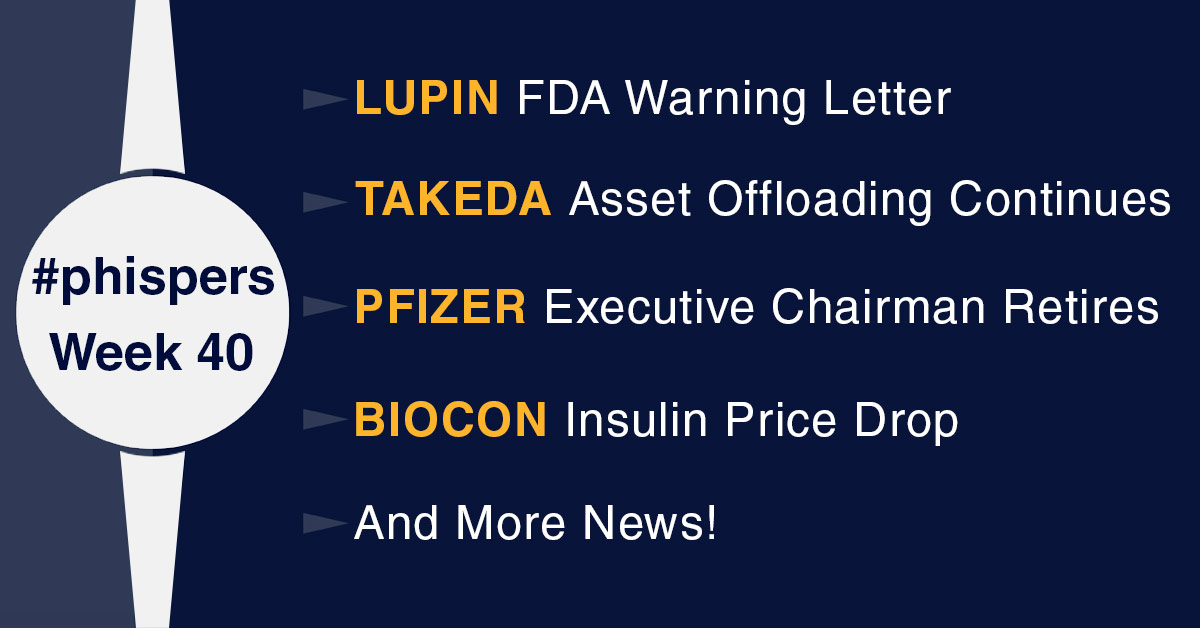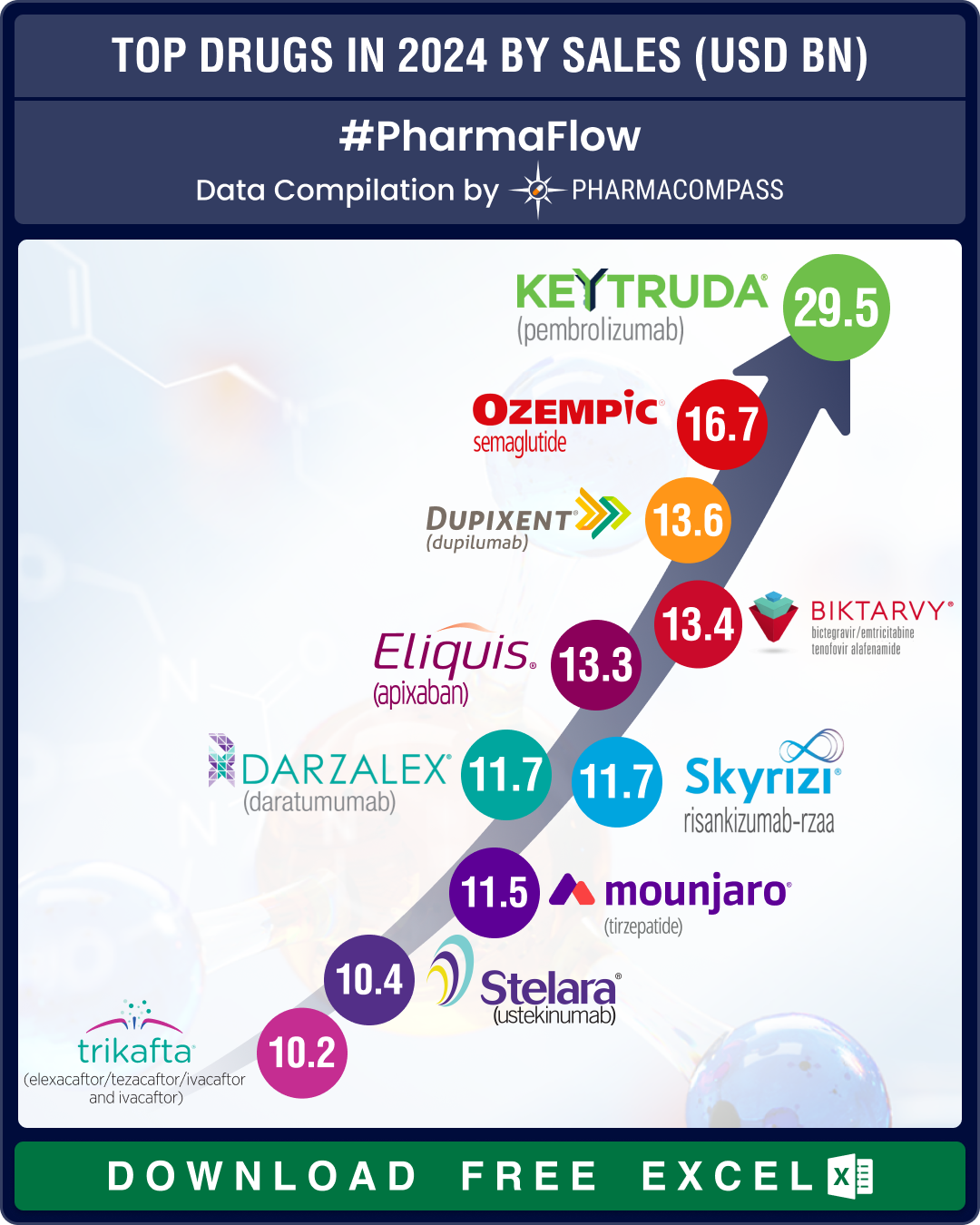
By PharmaCompass
2019-10-03
Impressions: 2942
This week, Phispers brings you an update on Takeda’s efforts at reducing its debt burden, as it decides to sell assets in emerging markets and western Europe.
Pfizer’s executive chairman Ian Read is stepping down by the year end, and Albert Bourla is set to step into his shoes.
The FDA issued a warning letter to Indian drugmaker Lupin’s Mandideep facility.
Mylan has agreed to pay US$ 30 million as settlement for its failure to tell investors about a US Department of Justice probe in the EpiPen case.
And Indian drugmaker Biocon said it will bring down the cost of insulin to 10 cents per day from US$ 5 currently.
Lupin’s FDA problems continue as Indian site receives warning letter
Earlier this year, two manufacturing sites of Indian generic major Lupin, one in India and another one in the United States — received ‘Official Action Indicated’ (OAI) letters from the US Food and Drug Administration (FDA).
The letter received from the FDA classified the inspections conducted at the company’s Mandideep (Unit 1) and Somerset (New Jersey) facilities in December 2018 as OAI, which means the facilities, are considered to be in an unacceptable state of compliance with regard to current good manufacturing practice (cGMP).
According to a Lupin spokesperson, the letter Lupin received from the FDA was a 90-day facility classification decisional letter. “We are taking corrective actions and communicating them to the FDA as we strive towards a positive outcome,” the spokesperson informed PharmaCompass through an email.
It seems that Lupin’s efforts were not enough as this week, the FDA issued a warning letter to Lupin’s Mandideep facility.
As in the past, once again investigations into out-of-specification (OOS) results were found to be inadequate. The firm was found to frequently close OOS investigations without an assignable root cause, and released batches based on passing retest results. The FDA found that there was a lack of sufficient investigations to determine the laboratory or manufacturing origins of the out-of-specification results and Lupin failed to implement adequate corrective actions and preventive actions (CAPA).
Lupin’s cleaning processes for manufacturing equipment as well as its process validation procedures were also found to be deficient.
The warning letter also highlights that repeated failures at multiple Lupin sites demonstrates that management oversight and control over the manufacture of drugs are inadequate.
Lupin’s operations in Indore and Goa received warning letters in 2017 and earlier this year, PharmaCompass had reported on how following the warning letter issued in 2017, an FDA Form 483 posted by the agency had highlighted recurring compliance issues at the Indian drug major’s Goa facility.
In April 2019, there was also news that the company has received a letter from the FDA classifying the inspection conducted at the Pithampur (Indore) Unit-2 facility in January 2019 as Official Action Indicated (OAI). The Form 483 issued to the facility had once again highlighted concerns over Lupin’s handling of OOS results.
Takeda
to offload OTC,
prescription drugs business in emerging markets,
Europe
For some months now, Takeda Pharmaceutical Co has been striving to reduce its debt burden incurred due to its US$ 62 billion purchase of Shire Plc in January this year. The deal was announced last year.
In May, Takeda had agreed to sell its eye-disease medicine, Xiidra, to Novartis AG for US$ 5.3 billion. And last week, a Bloomberg news report said the Japanese drugmaker is close to selling some assets in emerging markets and western Europe.
Takeda may announce a sale of over-the-counter (OTC) and prescription drugs in Latin America, the Middle East, Africa, Russia and Asia as early as in the coming weeks, the report said. A sale of the drugs, which Takeda acquired through its 2011 purchase of Swiss rival Nycomed, could fetch about US$ 3 billion in total, another Bloomberg news report published in January had said.
The asset sales would not only help Takeda reduce its debt, but also help simplify its portfolio after the Shire buyout. Takeda wants to offload all assets not core to its focus on gastroenterology, oncology, neuroscience, rare diseases and plasma-derived therapies. It has set a target of fetching US$ 10 billion through various divestments.
The company may decide to sell the products to different buyers by geography. According to the Bloomberg news report, Acino International AG (backed by buyout firms Nordic Capital and Avista Capital Partners) and Stada Arzneimittel AG (owned by Cinven and Bain Capital) are among bidders for different assets, the people said. Other companies that have shown an interest in some of the assets include Brazil’s EMS SA and Uniao Quimica Farmaceutica Nacional SA.
A separate sale by Takeda of its OTC and prescription medicines in Western Europe has drawn interest from private-equity firms such as Advent International, which owns drugmaker Zentiva, as well as Apollo Global Management Inc and Cerberus Capital Management. The assets could be valued at around US$ 1.1 billion (Euros 1 billion).
Pfizer executive
chairman Ian Read to retire by year-end; Bourla to take his place
Pfizer’s Executive Chairman Ian Read is all set to say goodbye to the American drug major. After spending 41 years at the company, including the last nine years as its CEO, Read says he plans to retire by the end of this year.
In January this year, Read had stepped down from the post of the CEO. Albert Bourla, who is currently the CEO of Pfizer, will take over as chairman after Read’s retirement.
Read joined Pfizer in 1978, became its CEO in 2010 and joined the board the following year. Last year, the drugmaker announced Read would move from chairman and CEO to executive chairman, with former COO Bourla taking on the CEO’s job.
The outgoing chairman said in a statement that he believes Pfizer’s “best days are yet to come—which is an exciting thought for patients and their families across the globe.”
In 2010, when Read took charge as the CEO of the American drug behemoth, Pfizer was still integrating Wyeth, LLC following a US$ 68 billion buyout in 2009. Pfizer’s 2010 revenues were US$ 62 billion in 2010, and dipped to US$ 50 billion in 2015. Productivity was lagging in those early years. While Read had to deal with those factors, Bourla said when he took over from him as the CEO, the situation was very different.
While Read was CEO, Pfizer scored 30 FDA approvals and returned US$ 120 billion to shareholders, the company said.
Mylan
to pay US$ 30 million in settlement in EpiPen overcharging case
Mylan has agreed to pay US$ 30 million in a settlement tied to its failure to tell investors about a US Department of Justice (DOJ) investigation into whether the company overcharged Medicaid for the EpiPen or not.
The Securities and Exchange Commission (SEC) said last week that Mylan classified the EpiPen as a “generic” drug under the Medicaid drug rebate program. As a result, Mylan paid much lower rebates to the government, as opposed to the rebates it would have had to pay if EpiPen was classified as a “branded” drug. In November 2014, the DOJ began a two-year civil probe into this.
In a press release, the SEC said Mylan overcharged Medicaid by “hundreds of millions of dollars” and drew the scrutiny of the DOJ.
But Mylan failed to disclose to investors the potential for losses related to the DOJ investigation for nearly two years. In October 2016, the company announced a US$ 465 million settlement with the DOJ.
The SEC said the drug company kept investors in the dark when it failed to disclose or set aside money for the two-year probe by the DOJ, prior to announcing a US$ 465 million settlement in October 2016.
In a statement, Mylan called the SEC civil settlement “the right course of action,” and said it was committed to the “highest levels of integrity” when communicating with investors and making disclosures in public filings.
The drugmaker had raised EpiPen prices by about 400 percent from 2010 to 2016, yet it paid a fixed rebate to Medicaid during that time. Mylan’s case provided fuel to the still-continuing nationwide debate over soaring drug prices.
After
Lilly, Sanofi and Novo, Biocon says
it will drop insulin prices to 10 cents a day
In September, we had carried news that Novo Nordisk had said it will offer cheaper insulin to Americans, following the example set by Sanofi and Eli Lilly earlier this year.
Last week, another drugmaker joined the ‘reduce insulin price’ bandwagon. Indian drugmaker Biocon said it will bring down the cost of insulin to 10 cents per day in low and middle-income countries.
Diabetes is a global pandemic that affects nearly half a billion people. Accessibility of insulin has been a major concern over the years due to its escalating price.
“Biocon will make its recombinant human insulin available at less than 10 cents per day in low and middle income countries. These countries contribute to 80 percent of the global diabetes burden. In comparison, the current US list price in retail is more than US$ 5 per day or more,” said Kiran Mazumdar Shaw, chairperson and managing director, Biocon.
The Bengaluru-headquartered biotech firm said it is “committed” to reducing the price of insulin “even further” through partnerships with agencies such as World Health Organisation (WHO) in order to break the barrier to access in certain geographies which are “too poor to deal with the challenge of diabetes on their own”.
The PharmaCompass Newsletter – Sign Up, Stay Ahead
Feedback, help us to improve. Click here
Image Credit : #Phisper Infographic by SCORR MARKETING & PharmaCompass is licensed under CC BY 2.0
“ The article is based on the information available in public and which the author believes to be true. The author is not disseminating any information, which the author believes or knows, is confidential or in conflict with the privacy of any person. The views expressed or information supplied through this article is mere opinion and observation of the author. The author does not intend to defame, insult or, cause loss or damage to anyone, in any manner, through this article.”








